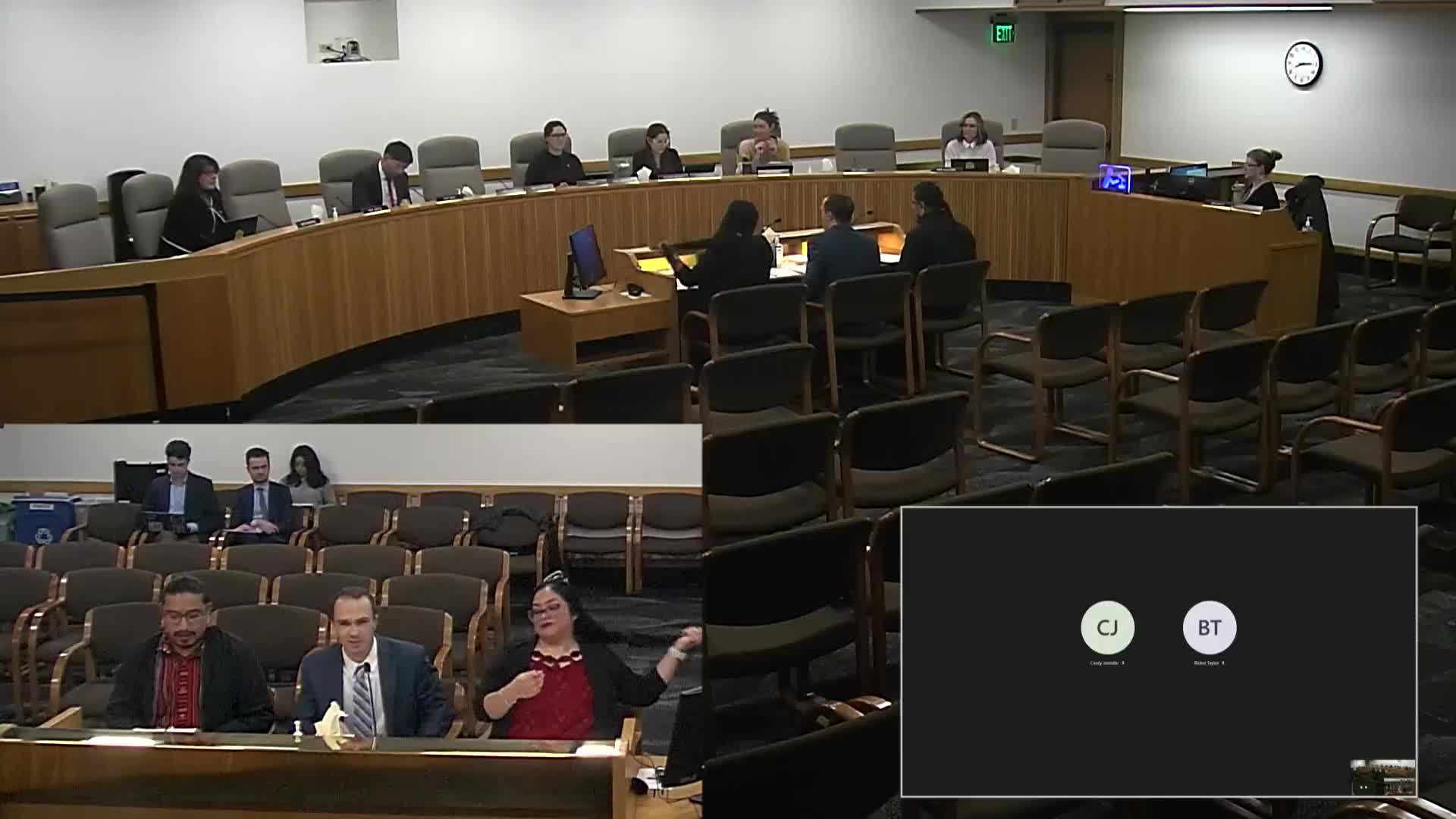Committee hears testimony on HB 29‑76 to fund indigenous language proficiency evaluations and interpreter workforce
March 18, 2025 | Early Childhood and Human Services, House of Representatives, Committees, Legislative, Oregon
This article was created by AI summarizing key points discussed. AI makes mistakes, so for full details and context, please refer to the video of the full meeting. Please report any errors so we can fix them. Report an error »

The House Committee on Early Childhood and Human Services held a public hearing on House Bill 29‑76, a bill sponsored to expand language access by funding creation of indigenous language proficiency evaluations and bolstering an indigenous interpreter workforce.
Cameron Veil, executive director of Pueblo Nido PDX, told the committee that language justice "is the fundamental human right to understand and to be understood" and that thousands of indigenous language speakers in Oregon face barriers to credentialing because language proficiency exams for many indigenous languages do not yet exist. "With limited exceptions, credentials are required by entities like Oregon Health Authority and the Oregon Judicial Department in order to provide interpretation services," Veil said.
Veil said the 2023 Legislature appropriated $2,000,000 to Pueblo Nido to develop four proficiency evaluations and that the 2025 request would appropriate $1,500,000 to develop three additional proficiency evaluations and to support recruitment, retention, and coordination of an indigenous interpreter workforce. "With this funding, we anticipate developing proficiency evaluations for 3 indigenous languages," a presenter told Representative Walters in response to a committee question.
Interpreter Byron Sok described delays he has observed in medical settings when indigenous interpreters cannot be located or credentialed. He recounted a case in which a pregnant patient with a Mayan language needed a specialist; it took two months to locate an interpreter, delaying the patient's ability to understand findings and consent to care. "This ultimate delay jeopardized the health of both the patient and her unborn child," Sok said, and he said the delays also required hospitals to spend more resources coordinating urgent care.
Malin Jimenez, a member of the Colectivo of Indigenous Interpreters of Oregon, described school and domestic‑violence cases in which lack of timely indigenous interpretation impeded parents’ ability to consent, access supports, or secure safety for children. She said the bill would help recruit and retain qualified interpreters across settings.
Representative Walters asked how many evaluations the requested funding would support; presenters said three. Representative Elmer asked whether the funds would be prioritized for health care; presenters said the proficiency evaluations are being created using assessment methodology accepted across healthcare and judicial settings and therefore would be usable by multiple agencies. The committee closed the hearing without taking a vote on the bill during the March 18 session.
Cameron Veil, executive director of Pueblo Nido PDX, told the committee that language justice "is the fundamental human right to understand and to be understood" and that thousands of indigenous language speakers in Oregon face barriers to credentialing because language proficiency exams for many indigenous languages do not yet exist. "With limited exceptions, credentials are required by entities like Oregon Health Authority and the Oregon Judicial Department in order to provide interpretation services," Veil said.
Veil said the 2023 Legislature appropriated $2,000,000 to Pueblo Nido to develop four proficiency evaluations and that the 2025 request would appropriate $1,500,000 to develop three additional proficiency evaluations and to support recruitment, retention, and coordination of an indigenous interpreter workforce. "With this funding, we anticipate developing proficiency evaluations for 3 indigenous languages," a presenter told Representative Walters in response to a committee question.
Interpreter Byron Sok described delays he has observed in medical settings when indigenous interpreters cannot be located or credentialed. He recounted a case in which a pregnant patient with a Mayan language needed a specialist; it took two months to locate an interpreter, delaying the patient's ability to understand findings and consent to care. "This ultimate delay jeopardized the health of both the patient and her unborn child," Sok said, and he said the delays also required hospitals to spend more resources coordinating urgent care.
Malin Jimenez, a member of the Colectivo of Indigenous Interpreters of Oregon, described school and domestic‑violence cases in which lack of timely indigenous interpretation impeded parents’ ability to consent, access supports, or secure safety for children. She said the bill would help recruit and retain qualified interpreters across settings.
Representative Walters asked how many evaluations the requested funding would support; presenters said three. Representative Elmer asked whether the funds would be prioritized for health care; presenters said the proficiency evaluations are being created using assessment methodology accepted across healthcare and judicial settings and therefore would be usable by multiple agencies. The committee closed the hearing without taking a vote on the bill during the March 18 session.
View full meeting
This article is based on a recent meeting—watch the full video and explore the complete transcript for deeper insights into the discussion.
View full meeting
